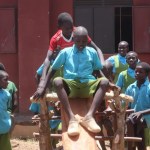In a sunlit community center in rural Oyam, northern Uganda, 16-year-old Grace bends intently over a vibrant piece of leather, her fingers deftly manoeuvring a needle. Beside her, a 15-year-old Esther sketches a design pattern while balancing her sleeping infant in a sling. These young mothers, once marginalized and stripped of hope, are now artisans crafting not just shoes but reclaiming their futures. Through Community Focus International (CFI)’s pioneering skills training program, supported by Grassroot Nest for Innovation and Change (GRiC), adolescent girls, teenage mothers, and school dropout girls across Otwal and Barr Sub-counties in Oyam and Lira districts are discovering economic independence and dignity, one stitch at a time.
Uganda’s teenage pregnancy rate remains alarmingly high, with deep-rooted impacts. Many pregnancies stem from school dropout, where isolated young girls facing limited support often end up conceiving at an early age. Pregnancy complications are a leading cause of death for girls aged 15–19, exposing young mothers to higher risks of obstructed labor, anaemia, sepsis and infant mortality. Beyond health risks, only 50% of teenage mothers globally graduate high school, creating generational poverty traps that limit income opportunities. Stigma often forces young mothers into early marriage or informal work, severing community ties and eroding self-worth. In Otwal and Barr Sub-counties in Oyam and Lira districts, Uganda where CFI focuses, these challenges intersect with disability inclusion and rural marginalization, compounding vulnerabilities.
CFI’s Socio-Economic Empowerment Program employs hands-on vocational training as a catalyst for change. The shoe design project exemplifies this approach. Participants master material selection, pattern design, stitching, and business skills like costing and marketing, with training aligned to Village Savings and Loan Associations (VSLAs) for startup capital access. Workshops accommodate young mothers through childcare spaces and flexible hours, while girls with disabilities receive adapted tools reflecting CFI’s cross-program synergy with its Assistive Technology unit. Local artisans co-teach alongside CFI’s social workers like Program Manager Ponsiano Coda, blending technical expertise with psychosocial support. Over 100 adolescent girls (aged 13–19), including teenage mothers, joined the 6-day training and mentorship. Graduates are expected to earn 2–3 times Uganda’s average daily wage from shoe sales, with GRiC funding critical materials, trainers, and childcare.

A Session On Shoe Design
GRiC’s support extends its legacy of investing in marginalized communities. Having secured a grant to expand tribal broadband access, GRiC understands how infrastructure whether digital or skills-based can catalyze opportunity. Their partnership with CFI reflects a shared vision of empowerment through self-reliance.
The LCI Chairpersons in the two areas provided critical backup support by actively facilitating marginalized girls’ participation in Savings Group formation, financial literacy, through participatory inclusion and capacity building. This duty bearer commitment transformed local attitudes, evident when institutionalized sustainable empowerment through skills, access, and dignity turned rights into tangible outcomes.
Local attitudes evolve as mothers contribute to household incomes. “They will call us ‘businesswomen’ now, not ‘burdens,’” laughs Esther.
CFI’s model proves holistic interventions unlock systemic impact. Trainees access CFI’s Sexual Reproductive Health (SRH) education, reducing repeat pregnancy risks. Programs aligned to Alternative Basic Education (ABE) help girls re-enter formal schooling. Critically, 30% of participants with disabilities can access CFI’s customized assistive devices alongside shoemaking tools. As Ben Ocan, CFI’s Executive Director, asserts: “Empowerment isn’t charity. It’s equipping the excluded to write their own narratives.”
In Otwal and Barr sub-counties, adolescent girls are no longer defined by motherhood or marginalization. They are artisans, entrepreneurs, and community leaders. With every shoe crafted a pair sold at market, an order shipped to Kampala they walk taller into a future they designed themselves. Thanks to CFI and GRiC, resilience has a new name: made in Otwal and Barr, stitched with hope.





